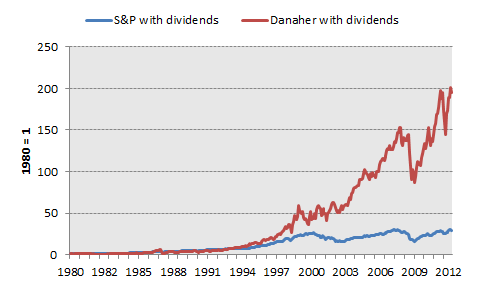Stocks for the Long Run: Danaher vs. the S&P 500
Investing isn't easy. Even Warren Buffett counsels that most investors should invest in a low-cost index like the S&P 500. That way "you'll be buying into a wonderful industry, which in effect is all of American industry," as he says.
But there are, of course, companies whose long-term fortunes differ substantially from the index. In this series, we look at how members of the S&P 500 have performed compared with the index itself.
Step on up, Danaher (NYS: DHR) .
Danaher shares have simply crushed the S&P 500 over the last three decades:

Source: S&P Capital IQ.
Since 1980, shares returned an average of 17.9% a year, compared with 11.1% a year for the S&P (both include dividends). That difference adds up incredibly fast. One thousand dollars invested in the S&P in 1980 would be worth $29,400 today. In Danaher, it'd be worth $195,500.
And have a look at how Danaher's earnings compare with S&P 500 earnings:

Source: S&P Capital IQ.
Again, massive outperformance. Since 1995, Danaher's earnings per share have grown by an average of 16.3% a year, compared with 6% a year for the broader index. Danaher has been one of only a few conglomerates to create significant value piecing businesses together, forming a parent company that's truly a profit machine.
That earnings-growth dynamic has also led to superior valuations. Danaher has traded for an average of 25 times earnings since 1980, compared with 21.3 times for the S&P.
Without a doubt, the company has been an above-average performer historically.
Of course, the important question is whether that can continue. That's where you come in. Our CAPS community currently ranks Danaher with a four-star rating (out of five). Do you disagree? Leave your thoughts in the comment section below, or add Danaher to My Watchlist.
At the time thisarticle was published Fool contributorMorgan Houseldoesn't own shares in any of the companies mentioned in this article. Follow him on Twitter @TMFHousel. The Motley Fool has a disclosure policy. We Fools may not all hold the same opinions, but we all believe thatconsidering a diverse range of insights makes us better investors. Try any of our Foolish newsletter services free for 30 days.
Copyright © 1995 - 2012 The Motley Fool, LLC. All rights reserved. The Motley Fool has a disclosure policy.

